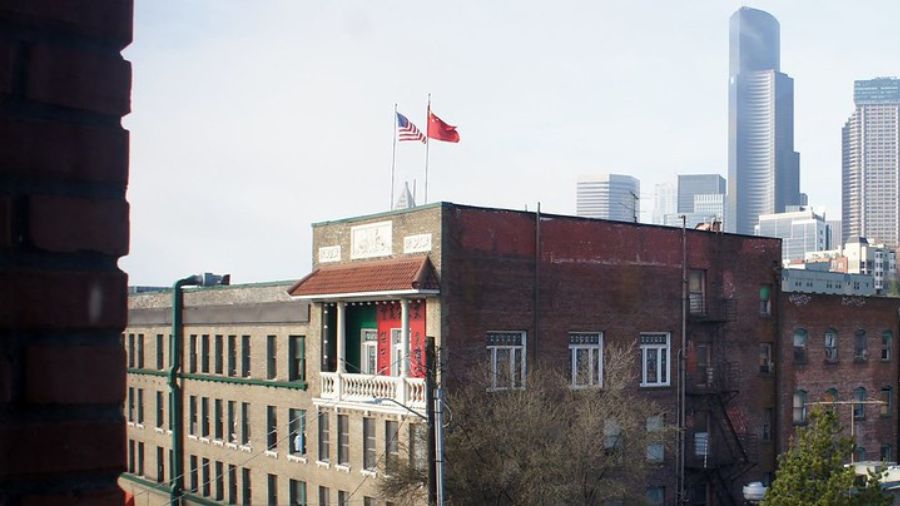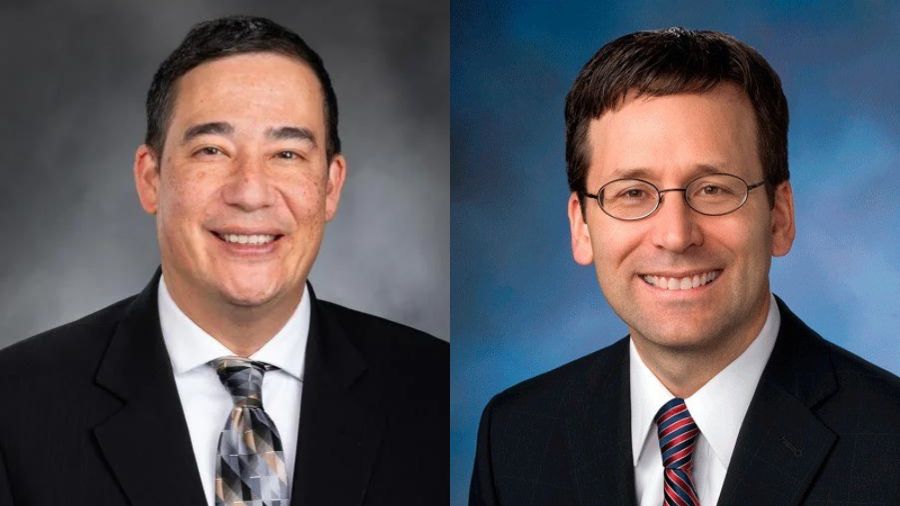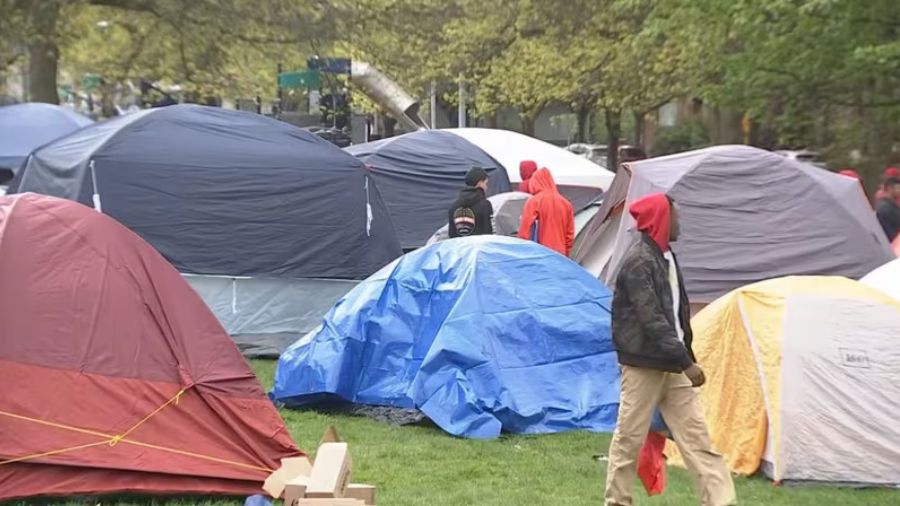Rantz: UW study dismisses drug concerns to protect transit, harm reduction advocates
Sep 10, 2023, 6:28 PM | Updated: Sep 11, 2023, 10:58 am

(Photo from Jason Rantz)
(Photo from Jason Rantz)
Transit agencies under fire for homeless addicts smoking meth and fentanyl in front of customers asked the University of Washington (UW) to study the matter. Transit’s goals were results that remove their financial liability from lawsuits, help them avoid renegotiations with unions representing bus drivers and light rail operators, and normalize drug use. The UW delivered, spinning questionable observations into a narrative that there’s hardly a risk to drug smoke exposure.
The “limited-scope” study measured drugs in the air and on the surfaces of transit in Washington and Oregon using just 11 buses and 19 train cars during evening routes. Reviewing just 78 air samples and 102 surface samples, researchers found meth in 98% of the surface samples and 100% of the air samples, and fentanyl in 46% of the surface and 25% of the air samples. Yet, the researchers said all is well in a press release that seemed intent on setting a narrative permissive of drug use and protective of transit agencies.
“In general, levels of methamphetamine and fentanyl found on transit vehicles in this exposure assessment are unlikely to cause acute, short-term physical health effects for the riding public who spend less time on transit than the operators,” researchers wrote. “At the levels seen in this study, there is no evidence of acute medical conditions resulting from passive exposure to fentanyl or methamphetamine (such as from touching contaminated surfaces or inhaling secondhand smoke).”
But the UW study didn’t test for acute medical conditions related to “passive” exposure to drug smoke. The main objective of the study was to provide an “exposure assessment.” They reviewed data on surface and air exposure; not whether or not people became or could become sick (see page 26 of the study). So why are we told that pregnant women, children, asthmatics, elderly, cancer patients, and everyone else is at virtually no risk of negative health outcomes?
Here's an unfortunately typical ride on Seattle's light rail from Sound Transit. Here, a (likely) homeless drug addict starts a fire, then smokes what's been identified as fentanyl by a transit driver who said it made him sick. pic.twitter.com/AoBChWGzhf
— Jason Rantz on KTTH Radio (@jasonrantz) April 10, 2023
You don’t really believe this UW drug study, right?
The UW press release accompanying its findings appears exceptionally biased. It reads like they were paid to offer certain results and, in some ways, downplays the observations in the finding itself.
For example, the study was conducted after transit drivers complained that they felt sick from the constant exposure to secondhand meth or fentanyl smoke. UW downplayed how often it was occurring, writing it off as just “Some operators reported instances of people smoking drugs on their vehicles.” But operators leveled a record-high number of complaints for smoking on their buses and train cars.
And even though meth was detected in 100% of the air samples and 98% on surfaces, UW said it was “nuanced” whether or not “transit operators [were] being exposed to drug smoke or residue in their workplace.” It’s not nuanced. Transit operators and the public were and continue to be unquestionably exposed. The research team, led by UW assistant professor of environmental and occupational health sciences Marissa Baker, calls it nuanced because they say it’s just a small amount. Except they have no clue whether or not a small amount impacts transit riders or customers — they’re guessing. It’s why their report says acute illness is “unlikely.”
Though not widely reported, the researchers admitted in their final report that they did not establish the “[l]ong-term health effects related to daily secondhand exposure to these substances,” which was one of the main complaints spurring the research in the first place. It also didn’t review how either transit operators or the general public felt after exposure to the drugs in the air. This important detail made it to the final report, but curiously not the press release about the report: “This assessment did not characterize short- or long-term health outcomes associated with secondhand exposure to fentanyl or methamphetamine.”
This wouldn’t be the first time a UW press release was tailored made for a specific agenda in conflict with some of what’s in the study. The UW previously claimed gender-affirming care via puberty blockers leads to positive mental health outcomes for transgender teen patients. That characterization, however, was false (so false, in fact, the UW had to delete materials being used to promote the research). But despite knowingly releasing false information to the press, the UW did not seek to proactively correct the record in any meaningful way because they were content with the coverage.
More from Jason Rantz: Despite ‘concerning’ transgender study, UW kept quiet because of positive coverage
UW warns of cigarette smoke and COVID, but not fentanyl and meth smoke
As a daily King County Metro rider, I often see homeless addicts either smoking at a bus stop or on the bus (almost always in the morning, a time UW did not study). I’ve seen it a few times on Sound Transit light-rail (they usually smoke in the entrances/exits at Westlake Center, rendering them unusable; and, again, in the AM when the UW study did not study). UW researchers are telling me that my exposure is perfectly reasonable with a broad-stroke guess, even though they do not know my medical history (which includes severe asthma). They’re not even erring on the side of caution.
“The detection of fentanyl or methamphetamine by the lab does not necessarily mean it poses a health risk to operators or the riding public, Baker said,” according to the press release. Baker could have said the opposite, too: exposure does not necessarily mean it poses no health risk. Suddenly, researchers (and the public health officials using this to pretend there’s nothing wrong with addicts using transit to get high) are framing a health issue around the likelihood that we’re safe from negative outcomes. Consider this framing versus the three years of COVID exposure narrative where we were warned to err on the side of caution, even after months of data concluded children are barely impacted by COVID, you can’t catch the virus outside, and neither washing hands nor the vaccine stops the spread of COVID. They still err on the side of caution. Yet with a “first-of-its-kind” study they’re erring away from the side of caution.
Laughably, we’re also supposed to fear second-hand cigarette smoke more than smoke from meth and fentanyl. All three UW campuses are smoke- and vape-free, citing health risks to people exposed to the smoke and vapor water. “Due to the population density of UW campuses, any smoking outside of designated smoking areas increases the risk of secondhand smoke exposure,” the UW warns.
Based on this UW study, you wouldn’t expect the campus to hold any health concerns with exposure to meth and fentanyl smoking on campus, right?
A UW study measured concentrations of fentanyl
— Washington Poison Center (@MRYUKWA) September 7, 2023
& meth on transit. The study did not examine health implications, so we issued a letter with @ORpoisoncenter:
1⃣Drug amounts were very small
2⃣Health impacts are not likely from these amounts
👉https://t.co/5XP5xcVq4x pic.twitter.com/5TyeY8UWgX
Study is about protecting transit and pushing ‘harm reduction’
The public health agencies in the areas these transit providers operate have adopted a “harm reduction” approach to drug addiction.
There is little to no interest in providing drug treatment; it’s why so few dollars are spent on it. Instead, they want to promote “safer” ways to smoke fentanyl or shoot up heroin. They tell you to have drug parties where you can watch people get high, hand out clean needles to shoot up or booty bumping kits for a more intense high, and seldom call out the inherent dangers of drug addiction because they don’t want to “stigmatize” the user.
UW researchers unrelated to this study also embrace “harm reduction.” The farther to the Left one is politically, the more likely they are to adopt this approach. UW is known for group-think and creating an echo chamber, aiming to push out anyone who thinks differently.
Their “harm reduction” strategy is informed by ideology, not science. I explore this deadly strategy at great length in my book What’s Killing America (releasing on September 26). Indeed, since public health departments embraced “harm reduction,” we’ve seen record-high fatal overdoses. They’re not reducing harm; quite the opposite.
Still, left-wing transit leadership subscribes to the same beliefs, giving them little meaningful interest in stopping public drug use, which is precisely why the crisis has grown. They neither want to face lawsuits nor renegotiate safety protocols with union drivers and now they have a study (that they paid for) that gives them an out.
More from Jason Rantz: Seattle media gives Inslee a pass on egregious lie
Media (mostly) doesn’t question the study or motives
Much of the media dutifully reported these findings uncritically. We’re all going to pay a price as a result, including those who live outside of the Pacific Northwest since this study will be used by others in Democrat-run cities to combat any legal or union complaints.
While there were some exceptions, local media just reprinted the press release with transactional stories. No dots are connected between the motives for the study findings or the obvious benefit to transit agencies to get the result they essentially paid for. No one seemed to note the conflict between the study downplaying health risks with actions by some transit agencies to install better air filtration systems. Why make this change if there’s no meaningful health risk? Even the UW study recommends the transit agencies develop “enhanced” cleaning protocols. Though operators and the public are safe to be around the drug smoke in the air and on surfaces, UW researchers tell the agencies to, “Consider the occupational health and safety needs of the cleaning personnel to safely perform these enhanced cleaning tasks.”
Much like cigarette companies touting studies that their products are safe, this transit/UW partnership seems like a sham. And we’d all be better off not just rejecting these claims about safety, but continuing to demand something be done around the drug crisis. Customers, operators, and the addicts deserve better. And the worst that can come of us ignoring the findings is that we’re exposed to less meth and fentanyl.
Listen to The Jason Rantz Show on weekday afternoons from 3:00 p.m.-7:00 p.m. on KTTH 770 AM (HD Radio 97.3 FM HD-Channel 3). He is the author of the book “What’s Killing America: Inside the Radical Left’s Tragic Destruction of Our Cities.” Subscribe to the podcast. Follow @JasonRantz on Twitter, Instagram, and Facebook. Check back frequently for more news and analysis.














